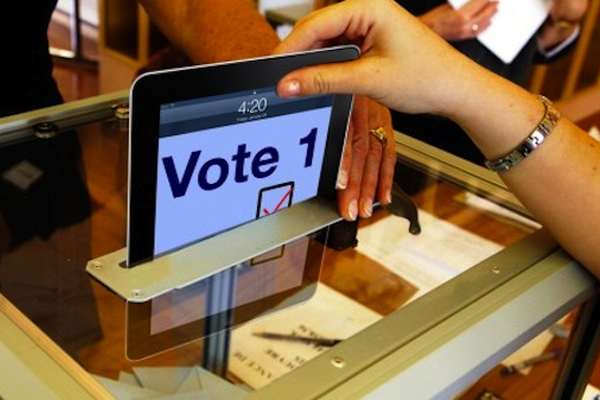Published on the 10/10/2018 | Written by Jonathan Cotton

With voter numbers dropping, postal services on the decline and booth-voting pure misery, is it time for a digital solution?..
Of course it is, and it may be arriving sooner than expected, for Kiwis at least: Nine New Zealand local councils are currently seeking proposals for online voting trials to take place in elections next year.
It’s good news, and certainly in line the public appetite. A 2016 post-election voter awareness survey conducted by Auckland Council found 74 percent of respondents (across all age categories) would prefer online voting to postal voting.
So what’s the hold up?
“A lack of public confidence in online voting is a risk to successful implementation and uptake.”
Well, it’s a work in progress and has been for some time – the government has been looking at the issue since 2013 when the Online Voting Working Party was established in New Zealand to consider the matter. That party found that online voting has the potential to address some concerns with the current local electoral framework, but that there were “significant risks” associated with its use, most notably, security, accuracy and public perception.
“A lack of public confidence in online voting is a risk to successful implementation and uptake,” explained the framework document at the time.
“Further, technology failure as part of an online voting trial could undermine public confidence in local authority capability, any potential for future use of online voting by local government, and public comfort with carrying out other official transactions online.”
Those concerns scuttled plans for online voting then, with the Government insisting that more work was needed to meet public expectations and maintain confidence in local electoral processes.
But that was then and this is now, with the introduction of the Local Electoral Matters Bill to support trials of online voting in the 2019 local authority elections.
Simply put, the bill looks to ‘modernise and future proof New Zealand’s local electoral system’ by supporting local trials for online voting. So far nine local councils – Auckland, Gisborne, Hamilton, Marlborough, Matamata-Piako, Palmerston North, Selwyn District, Tauranga and Wellington City Council – have signed on to participate in the trial which will operate alongside traditional postal voting.
The system will need to be able to demonstrate interoperability with New Zealand’s two main electoral systems – First Past the Post (FPP) and Single Transferable Vote (STV) – and is contingent on the appropriate legislation being passed in time.
It’s an issue Australia is yet to fully address. In 2013 a paper on internet voting by the Electoral Council of Australia and New Zealand recommended that any move towards its implementation should have ‘strong and informed public and political consensus in favour of such a move’.
That consensus now seems to be in place – at least for the general public – and in 2015, more than 280,000 votes were in fact received in the New South Wales election from a personal computer or mobile, the largest-ever binding election to use online voting. It was a hopeful start, but ultimately a serious misfire with the discovery of serious security vulnerability in the iVote system caused by code imported into the secure voting session from an insecure third-party server.
“The vulnerability was repaired, but by that stage, 66,000 votes were cast,” says Vanessa Teague, senior lecturer in the Department of Computing and Information Systems, University of Melbourne and co-discoverer of the security flaw.
“Just 3,000 votes determined the result of a disputed seat in the Legislative Council. There is no evidence that the security hole was exploited, but also no evidence that it was not.”
According to Teague, some iVote returns differed notably from those cast by more secure channels.
“The ALP received about 30 percent of the votes on paper in the Legislative Council, for instance, but only 25 percent via iVote. The NSW Electoral Commission blamed these differences on a user interface design problem, but it might also have been a software error or a security breach.”
And it doesn’t stop there. In 2016 it was discovered that a software error resulted in a mistake in the 2012 results of the NSW Local Government elections.
“The lesson from the bugs in the ACT and NSWEC vote-counting code is clear: Make the computer code available for public inspection so that we can scrutinise it for errors before the election,” says Teague.
“Receiving votes from the internet is the easy part. Proving that you got the right result, while keeping votes private, is an unsolved problem.”
And it’s that lack of certainty that’s one of the key concerns with online voting proposals. With privacy paramount, it can be difficult – or impossible – to confirm that the system is working accurately.
Nevertheless, confirmation of whether the New Zealand trial will go ahead is expected before Christmas, even though the issue of how the security issues are being address is not yet clear.
“We won’t proceed if we aren’t confident that we can deliver an online voting system that is equally or more secure than the postal voting system,” says a representative from the Online Voting Project. “No system is ever 100 percent secure, but we’re working to find an alternative to postal voting with very high levels of security assurance. We’ll be working with IT security experts to ensure stringent auditing, reviewing and penetration testing.
“New Zealanders already do lots of things online – like online banking, applying for passports and bank loans, which illustrates how robust our online security processes have become. Similarly, we’ll be taking all practicable steps to ensure any online voting security is as secure as possible.”
There’s always plenty of talk about ways to increase voter engagement – modernisation of the voting process to increase voter engagement is surely a good bet to achieve that, at least in the short term.
Caution is still required of course. Some countries, like Norway, have trialled online voting then reverted back to traditional methods over concerns around system integrity. (Incidentally, Norway found that the experiment did not increase voter turnout, even among younger demographics.) On the other hand, Canada has had success with online voting, steadily increasing its use since its implementation in 2003.
Both access and integrity are crucial to a functioning political system. Hopefully the two will be carefully balanced in these first tentative steps towards a more modern electoral process.



























